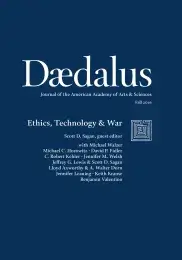Moral Character or Character of War? American Public Opinion on the Targeting of Civilians in Times of War
Since the end of the Vietnam War, the United States has refrained from the widespread, intentional targeting of civilian populations in times of war. Public opinion polls seem to reflect a marked decline in American support for targeting foreign civilians since that time. Drawing on original public opinion surveys, as well as other historical material, this essay explores several explanations for these changes. Although there is some evidence that the public's views about the morality of civilian targeting have shifted, I argue that two other explanations also play an important role in the changes in the conduct of American wars. First, a mounting skepticism, especially within the U.S. military, about the efficacy of killing civilians, has undercut the primary motivation to even consider such tactics. Indeed, many U.S. military leaders now perceive that killing adversary civilians in large numbers – intentionally or unintentionally – usually backfires, making the adversary fight harder or driving more civilians to join or support the adversary's forces. Second, due to the lower stakes, and especially the dramatically lower fatality rates suffered by American troops in recent wars, the temptation to attempt to end wars quickly with a “death blow” against adversary cities has become less potent. Under certain conditions, however, a majority of Americans would still support today the kind of population bombing last practiced during World War II.
Nineteen forty-five was the dawn of not only the nuclear era, but also the era of scientific public opinion polling. In September of that year, Roper Opinion Research conducted a nationwide public opinion poll for Fortune magazine on the use of nuclear weapons against Japan one month earlier. The results showed that the majority of the nation (54 percent) agreed that the United States “should have used the two bombs on cities, just as we did.”1 But 14 percent believed that “we should have dropped one first on some unpopulated region, to show the Japanese [the bomb’s] power, and only dropped the second one on a city if they hadn’t surrendered after the first one.” Only 5 percent of the public felt that “we should not have used any atomic bombs at all,” while 23 percent, however, preferred instead that “we should have quickly used many more of them before Japan had a chance to surrender.”2 This echoed a 1944 poll that asked, “What do you think we should do with Japan as a country?” to which 13 percent of American respondents chose “kill all Japanese.”3 Although racism and the resentment provoked by Pearl Harbor undoubtedly hardened attitudes against the Japanese, there was also virtually no public opposition to the U.S. and British bombing of civilian populations in Germany, which killed nearly as many civilians as were killed by the U.S. bombing of Japan.
Many Americans contemplating these results today will be shaken by the willingness of their fellow citizens to support the intentional killing of hundreds of thousands of civilians. Indeed, when I replicated the 1945 atomic bombing poll in 2012, using nearly identical wording, the results were markedly different.4 Sixty-seven years later, only 30.2 percent of the public agreed that dropping the bombs on Hiroshima and Nagasaki had been the right choice. More than twice as many (29.9 percent) indicated that they would have preferred a demonstration first on an unpopulated region, while more than four times as many people in 2012 (19.8 percent) said that the United States should not have dropped any bombs on Japan. Just 2.5 percent regretted that the United States had not used many more bombs before Japan had the chance to surrender – about one-tenth the proportion who preferred that option in 1945.5 . . .
